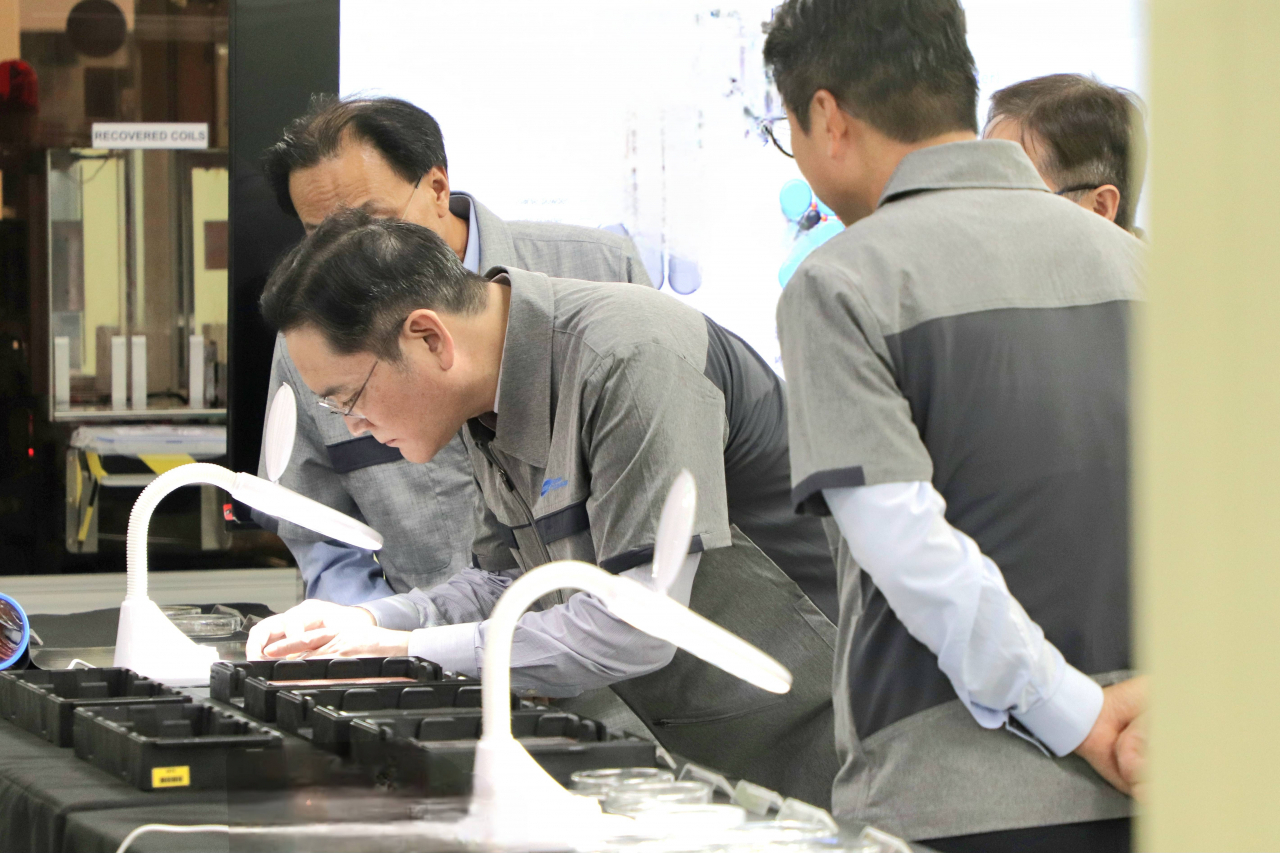
 |
| Samsung Electronics Chairman Lee Jae-yong (second from left) visits Samsung Electro-Mechanics Philippines, the parts-maker's local operation in Calamba, Philippines, Sunday. (Samsung Electronics) |
Samsung Electronics Chairman Lee Jae-yong visited the production base of multilayer ceramic capacitors for Samsung Electro-Mechanics, the electronic parts manufacturing affiliate of Samsung Electronics, in Calamba, Philippines, Sunday, according to the tech giant on Monday.
The chairman reviewed business strategies and stressed the importance of taking advantage of opportunities arising from expanding markets such as artificial intelligence, robots and electric vehicles.
Lee also discussed future strategies with management, including Samsung Electro-Mechanics CEO Chang Duck-hyun, before touring the MLCC plant. He met with local employees, thanking them for their hard work and listening to their challenges as well.
The Philippine production, established in 1997, completed its second MLCC plant in 2012. In 2015, an additional investment of 288 billion won ($214 million) was made to expand production lines, making it a key production base alongside facilities in Busan and Tianjin, China.
Since 2000, Samsung Electro-Mechanics has produced MLCCs and inductors for IT devices in the Philippines. With the rapid growth of EVs and self-driving technologies, the company is also considering expanding the production of high-performance MLCCs for automotive electronics.
Lee has designated the automotive electronics sector as Samsung's future growth engine. Following visits to the Tianjin site in March last year and the Suwon site in June this year, where he encouraged new business development, he has been actively pushing for Samsung Electro-Mechanics to dominate the high-value MLCC market.
In 2020 and 2022, the Samsung chief visited the Busan facility to inspect MLCC production and emphasized the need to respond to the accelerating pace of change and lead innovation, particularly in automotive MLCC.
Samsung aims to transform Busan into a specialized high-tech region for MLCC research and development and production of key materials while operating facilities in China and the Philippines as global key supply bases for IT and automotive MLCCs.
The MLCC market is expected to grow from 4 trillion won in 2023 to 9.5 trillion won by 2028, according to industry sources. While about 1,000 MLCCs are used in smartphones, EVs require 18,000 to 20,000 MLCCs, with prices more than three times higher.
Samsung Electro-Mechanics, which has been developing and producing MLCCs since 1988, maintains its technological competitiveness by designing and manufacturing key raw materials in-house and continues to expand its investments.
In response to the growth of the EV and advanced driver assistance system markets, the company is focusing on automotive MLCCs, aiming to reach 1 trillion won in sales in this sector.
The chairman has been strengthening cooperation with global automobile companies, meeting with key executives such as Hyundai Motor Group Executive Chair Chung Euisun, BMW Group Chairman Oliver Zipse and Tesla CEO Elon Musk. In May last year, Lee met Musk in Silicon Valley to discuss comprehensive cooperation, including in automotive semiconductors.
Meanwhile, Lee is set to accompany President Yoon Seok Yeol on a state visit to the Philippines and Singapore as part of a business delegation, attending business forums to promote the bilateral cooperation between the countries.









